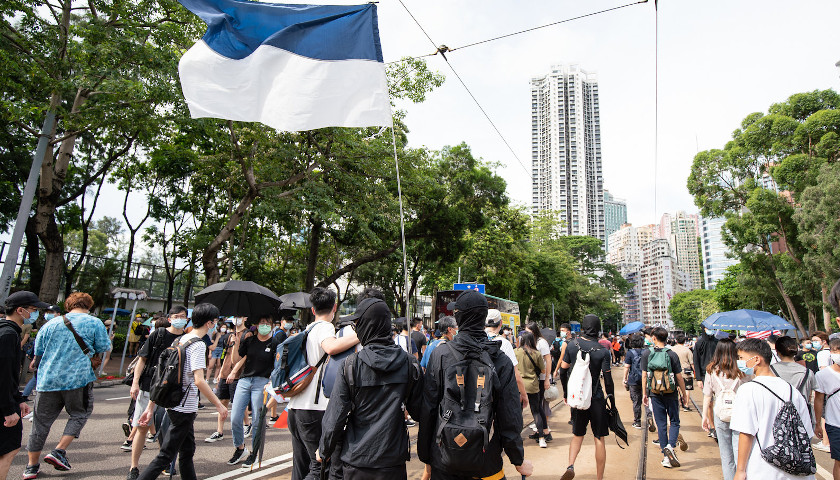by Andrew Kerr
Major American companies were quick to issue statements in support of Black Lives Matter or social justice causes in the aftermath of George Floyd’s death, but dozens of those same firms that have operations in Hong Kong have yet to weigh in on the Chinese Communist Party’s de facto takeover of the city.
Bank of America, Coca-Cola, Marriott, McDonalds, Nike and Scholastic are among the dozens of major American companies with footholds in Hong Kong that weighed in after Floyd’s death but have yet to weigh in on the new security law Beijing recently imposed on the city, which impacts its employees working in the city and which critics say is designed to crack down on dissent of the ruling Communist Party.
 The Daily Caller News Foundation reached out to 31 major American companies listed in the American Chamber of Commerce (AmCham) Hong Kong membership directory that haven’t issued public statements on the security law while issuing statements attesting to their commitment to social justice and racial equality in America, asking if they had any comment on the law.
The Daily Caller News Foundation reached out to 31 major American companies listed in the American Chamber of Commerce (AmCham) Hong Kong membership directory that haven’t issued public statements on the security law while issuing statements attesting to their commitment to social justice and racial equality in America, asking if they had any comment on the law.
American Express Vice President of Corporate Affairs and Communications Andrew R. Johnson provided the DNCF with a link to a June 3 statement on its website announcing it would be donating $1 million to the National Urban League and NAACP Legal Defense and Educational Fund following the publication of this article, however, he declined to comment when asked if the company had any comment on the Hong kong security law
The People’s Bank of China granted approval to American Express on June 13 to process Chinese currency, making it the first foreign payments network to receive such approval in the country.
“This approval represents an important step forward in our long-term growth strategy,” American Express CEO Stephen Squeri said in a statement, Bloomberg News reported.
Dell Technologies was the only company that responded to the DCNF, saying in a statement through a spokesperson: “The implications of China’s National Security Law are still evolving. We are evaluating what the possible impact could be to our team members and operations in Hong Kong.”
HP, whose CEO, Enrique Lores, quoted Martin Luther King saying, “Injustice anywhere is a threat to justice everywhere,” in a statement in late May following Floyd’s death, did not respond to the DCNF. Nor did Walmart, whose CEO Doug McMillon said in June that the company’s goal was to “help replace the structures of systemic racism, and build in their place frameworks of equity and justice that solidify our commitment to the belief that, without question, Black Lives Matter.”
Most of the American companies that have commented on the Hong Kong security law are technology firms that manage user data such as Facebook, Google, Twitter, Microsoft, Zoom and Telegram, all of which announced last week that they would temporarily pause sharing data with Hong Kong following the implementation of the security law, Fortune reported.
The New York Times also announced on Tuesday it would relocate its Hong Kong-based digital news operation to South Korea, citing concern that the security law would impact its ability to produce journalism.
The security law has the majority of American companies in Hong Kong on edge, according to a survey conducted by AmCham in Hong Kong in early July which found that 76% of its members were “extremely concerned” or “somewhat concerned” about the law. Despite those concerns, over 64% of the survey respondents said their companies had no intention of leaving the city.
“There is a small minority who feel much better because the streets … are quieter, and they feel they are safer there. But the majority … were concerned, or extremely concerned about the national security law,” AmCham Hong Kong president Tara Joseph told CNBC.
The law applies to any person that engages in what Beijing defines as “subversive” activities in Hong Kong, including those who aren’t permanent residents, meaning employees working for American companies in the city could be impacted.
The Hong Kong security law, approved in secret in Beijing in late June, criminalizes successionist and subversive activities in the city, according to the Wall Street Journal, and enables the Chinese communist government to supervise and intervene in the policing of such activities in the city. Violators of the law could face life in prison.
The law was implemented after months of widespread pro-democracy protests in Hong Kong against Beijing’s creeping influence in the city.
“It’s meant to suppress and oppress, and to frighten and intimidate Hong Kongers,” pro-democracy lawmaker Claudia Mo told The New York Times. “And they just might succeed in that.”
– – –
Andrew Kerr is a reporter for the Daily Caller News Foundation. Fiona Murchake contributed to this report.
Photo “Hong Kong Protesters” by Studio Incendo. CC BY 2.0.




